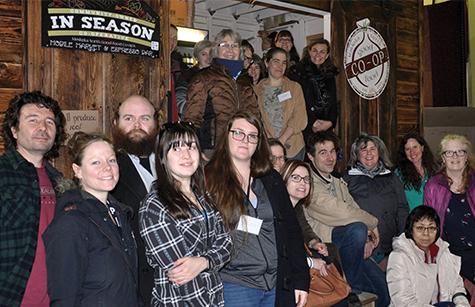Ontario’s Resilient Food System

When the food sovereignty movement combined with the devastating impacts of the 2008 recession to re-energize the cooperative model, an opportunity for collaboration across the Canadian province of Ontario arose. After more than eight years, The Local Organic Food Co-op Network—newly renamed Local Food and Farming Co-ops (LFFC)—continues to adapt to a complex operating reality while harnessing the passion and strengths of the outstanding people who drive the organization forward.
For U.S. readers, the closest relative to LFFC is the Neighboring Food Co-op Association in the Northeast (www.nfca.coop). However, there are key differences. LFFC operates across the province of Ontario (a diverse land mass larger than Alaska with only 13 million people) and includes cooperatives from across the food supply-chain—including land trusts and brewing, farming, and retailing co-ops. More importantly, Canada never developed the dense network of natural food co-op retailers that allowed for large stores and a central organization such as National Co+op Grocers to form. An original vision for mature natural food co-ops to provide support to network members was stunted for lack of alignment, lack of funds, and the painful loss of a couple of these co-ops over the past few years.
The Ontario Natural Food Co-op (ONFC) provided incubation space and core funding to the local co-ops for some years. ONFC, a close cousin to earlier U.S. distributors Blooming Prairie and Northeast Co-ops, sometimes struggled with alignment and withdrew all funding of LFFC for 2017 due to financial constraints. In March 2017 ONFC members voted to demutualize their forty-year old distribution co-op in the face of financial duress. (See accompanying report.)
Strengths to build upon
The challenges of the operating environment aside, LFFC continues to evolve due to strengths in a few key areas.
First, many of the co-ops that emerged over the past years are achieving a level of critical mass and stability that re-energizes LFFC with fresh volunteers. These include Eat Local Sudbury, the Forest City Workers’ Co-op in London, the Mustard Seed in Hamilton, and West-End Food Co-op in Toronto. The people behind these exceptional young organizations can only be described as both inspirational and unstoppable in realizing their missions.
Second, since it works in a diffuse co-op environment LFFC wisely leverages a wide-range of relationships. This includes available support from federal and provincial co-op associations, partnerships with non-profit groups working on food issues, sponsorship from key partners within the credit union sector, and core operating funds from The Co-operators (a national insurance provider). LFFC also earned substantial grants for innovative projects that explore rebuilding provincial trade routes, developing co-ops in the rugged economic landscape of Ontario’s north, and marketing activities that benefit the entire membership.
Third, the members sustained a smoothly operating Steering Committee, negotiated a prominent change in staff leadership, continue to offer an outstanding annual assembly for members—and now plan to incorporate as a distinct entity after some years of working semi-independently as a committee of Ontario Natural Food Co-op.
This 2017 annual assembly (held March 21–22) continued to reflect the more recent transition of the event from one emphasizing mutual support—where people bonded over hard and lonely stories of working to build mission-based co-ops in their disparate communities—to an event reflected the gritty reality of maintaining a progressive business within a competitive food environment. A focal point for the assembly was a full-day workshop on accessing finance (follow-up to a similar event last year).
Led by the strategic vision created by members at the last assembly, LFFC is also looking for ways to provide practical services to its membership as it matures into a professional association capable of earning dues and consulting fees.
After being located near Toronto for many years, this year’s assembly was held in the near-north town of Huntsville and was hosted by the many volunteers of the recently incorporated Muskoka North Good Food Co-op.
Finally, Local Food and Farming Co-ops’ willingness to borrow from existing models and its continued connections with U.S. partners was reinvigorated by inviting Allison Hermes executive director of Principle Six (www.p6.coop) to be this year’s keynote speaker. It was Allison’s first time visiting Canada, and there was much to share. ♦







